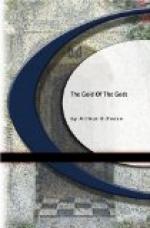“I hope that you will pardon me for intruding,” began Craig, with as plausible an explanation as he could muster, “but I have become interested in an opportunity to invest in a Peruvian venture, and I have heard that you are a Peruvian. Your son, Alfonso, I have already met, once. I thought that perhaps you might be able to give me some advice.” She looked at us keenly, but said nothing. I fancied that she detected the subterfuge. Yet she had not tried, and did not try now to avoid us. Either she had no connection with the case we were investigating or she was an adept actress.
On closer view, her eyes were really even more remarkable than I had imagined at a distance. They were those of a woman endowed with an abundance of health and energy, eyes that were full of what the old character readers used to call “amativeness,” denoting a nature capable of intense passion, whether of love or hate. Yet I confess that I could not find anything especially abnormal about them, as I had about the eyes of Lockwood and Whitney.
It was some time before she replied, and I gave a hasty glance about the apartment. Of course, it had been rented furnished, but she had rearranged it, adding some touches of her own which gave it quite a Peruvian appearance, due perhaps more to the pictures and the ornaments which she had introduced rather than anything else.
“I suppose,” she replied, at length, slowly, and looking at us as if she would bore right through into our minds, “I suppose you mean the schemes of Mr. Lockwood—and Mr. Whitney.”
Kennedy was not to be taken by surprise. “I have heard of their schemes, too,” he replied noncommittally. “Peru seems to be a veritable storehouse of tales of buried treasure.”
“Let me tell you about it,” she hastened, nodding at the very words “buried treasure.” “I suppose you know that the old Chimu tribes in the north were the wealthiest at the time of the coming of the Spaniards?”
Craig nodded, and a moment later she resumed, as if trying to marshal her thoughts in a logical order. “They had a custom then of burying with their dead all their movable property. Graves were not dug separately. Therefore, you see, sometimes a common grave, or huaca, as it is called, would be given to many. That huaca would become a cache of treasure in time. It was sacred to the dead, and hence it was wicked to touch it.”
The Senora’s face betrayed the fact that, whatever modern civilization had done for her, it had not yet quite succeeded in eliminating the old ideas.
“Back in the early part of the seventeenth century,” she continued, leaning forward in her chair eagerly as she talked, “a Spaniard opened a Chimu huaca and found gold that is said to have been worth more than a million dollars. An Indian told him about it. Who the Indian was does not matter. But the Spaniard was an ancestor of Don Luis de Mendoza, who was found murdered to-day.”




